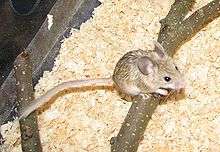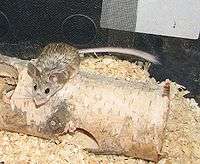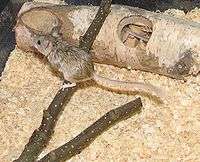Mouse-like hamster
Mouse-like hamsters are a group of small rodents found in Syria, Azerbaijan, Iran, Turkmenistan, Afghanistan, and Pakistan. They are found in rocky outcrops and semi-mountainous areas in desert regions.
| Mouse-like hamsters | |
|---|---|
 | |
| Scientific classification | |
| Kingdom: | Animalia |
| Phylum: | Chordata |
| Class: | Mammalia |
| Order: | Rodentia |
| Family: | Calomyscidae Vorontsov & Potapova, 1979 |
| Genus: | Calomyscus Thomas, 1905 |
| Species | |
|
Calomyscus bailwardi | |


The mouse-like hamsters are not true hamsters, but represent an early split from the rest of the mouse-like rodents. They were once thought to be hamsters based on the shape of their molars, but they lack the cheek pouches, flank glands and short tails of the true hamsters. The closest relatives of the mouse-like hamsters may be the extinct Cricetodontidae. Because of their seemingly early break from the rest of the mouse-like rodents, mouse-like hamsters have been placed in a family of their own, Calomyscidae, and have been referred to as living fossils.
All members of the genus were once considered part of the same species, Calomyscus bailwardi, but the two are now referred to as separate species due to major differences in chromosome number, skull measurements, and other features.[1]
In Europe, a species of Calomyscus is available as a pet. They are labelled Calomyscus bailwardi mystax or Calomyscus bailwardi. They are generally only available from dedicated breeders, not pet shops.
Species
Family Calomyscidae
- Genus Calomyscus
- Zagros Mountains mouse-like hamster, C. bailwardi
- Baluchi mouse-like hamster, C. baluchi
- Goodwin's mouse-like hamster, C. elburzensis
- Zykov's mouse-like hamster, C. e. zykovi
- Noble mouse-like hamster, C. grandis
- Hotson's mouse-like hamster, C. hotsoni
- Great Balkhan mouse-like hamster, C. mystax
- Tsolov's mouse-like hamster, C. tsolovi
- Urar mouse-like hamster, C. urartensis
References
- Jansa, S. A. and M. Weksler. 2004. Phylogeny of muroid rodents: relationships within and among major lineages as determined by IRBP gene sequences. Molecular Phylogenetics and Evolution, 31:256-276.
- Michaux, J., A. Reyes, and F. Catzeflis. 2001. Evolutionary history of the most speciose mammals: molecular phylogeny of muroid rodents. Molecular Biology and Evolution, 17:280-293.
- Musser, G. G. and M. D. Carleton. 2005. Superfamily Muroidea. pp. 894–1531 in Mammal Species of the World a Taxonomic and Geographic Reference. D. E. Wilson and D. M. Reeder eds. Johns Hopkins University Press, Baltimore.